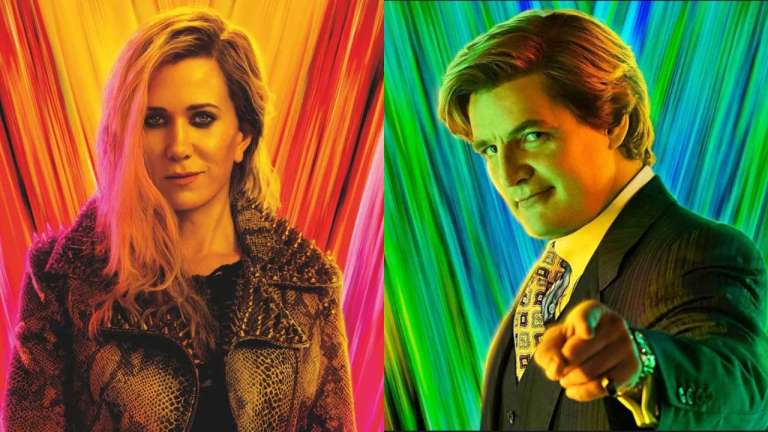How Wonder Woman 1984 Treats Its Villains Sets the Movie Apart
Wonder Woman 1984 villains Cheetah and Maxwell Lord aren't your usual blockbuster baddies, and that's a good thing.

This article contains Wonder Woman 1984 spoilers. Our spoiler free review can be found here.
It’s widely acknowledged that between DC and Marvel, DC has the best villains. From the volatile anarchy of the Joker to the delicious anti-heroine of Catwoman, some have even become worthy of their own spin-off movies. So it was a fascinating decision by co-writer and director Patty Jenkins to take a different route with the baddies for Wonder Woman 1984. Namely, that neither are truly villainous.
Max Lord
Ok, Pedro Pascal’s Max Lord is a selfish, greedy con man who doesn’t care about what he does to society in the pursuit of money and power. He’s not evil per se, isn’t out for revenge, doesn’t actively wish death upon anyone; he just doesn’t care about the consequences of his actions. He is the embodiment of corrupt ‘80s capitalism and the pursuit of more, more, more, regardless of the harm this might do to the environment, to society, or to the world as a whole.
Lord might nearly bring about the apocalypse, but he can’t be held solely to blame. He doesn’t force the President to ask for more nukes. It’s not his fault the Egyptian oil baron wishes for land restrictions. He didn’t make the sex tape the televangelist wants erased, right? Lord is completely self-serving and amoral, but it is society as a whole – the ‘80s society of which Lord is a product – that ultimately causes its own downfall, and eventually its own redemption, too. It’s Diana’s job to remind us to be our better selves, the film says, but she can’t do it for us; we, ultimately, have to take action and responsibility for ourselves and for the world.
By the close of the movie, Lord has learned his lesson just like every other citizen who has made a wish. And just like them he is delivered – he survives the movie and is reunited with his son, who still loves and needs him. Diana may have been the reminder of kindness and reason that most of the world needed, but, for Lord, it was Alistair who is the tangible reminder of the abundance he always had. And, in the world of Wonder Woman, Lord, despite the chaos and pain he has caused, deserves that chance at redemption.
Barbara Minerva and Cheetah
The character of Cheetah is far more complex.
In the comics, Cheetah is often considered Wonder Woman’s arch nemesis. She’s had various incarnations but Barbara Minerva from the comics is powerful, wealthy, and ambitious and, rather than being given powers thanks to a wish, she gains them via a plant god on an expedition to an ancient African tribe. This comics-based version of Cheetah wants to steal Wonder Woman’s lasso of truth and sometimes goes head to head with her because of her damaged pride.
But the Barbara Minerva of Wonder Woman 1984 isn’t like that at all.
Embodied by Kristen Wiig, Barbara is instead a good hearted dork. She is highly educated and specializes in a number of different disciplines (it’s hinted at that this might be because she didn’t have much of a social life at University), but she’s often forgotten or overlooked. This Barbara wants to be friends with Diana, and when they do spend an evening together both women have a good time and a good laugh.
Despite being beautiful and strong, it turns out Diana doesn’t have much of a social life either. These two women could be firm friends and allies, and indeed for most of the duration of Wonder Woman 1984 they are just that, with Diana calling on Barbara for help to investigate the mysterious citrine that appears to grant wishes.
Barbara, though, has allowed Max Lord to take it, who has now become one with the stone in order to wield power over anyone who uses it to make a wish. Barbara is attracted to Lord and her judgment is clouded, but she is not a “less actively developed” woman, as Wonder Woman and Cheetah creator William Moulton Marston once described the character. While his Cheetah embodied the dangers of jealousy, our Barbara, at first at least, doesn’t want to beat Diana, she wants to be like her. She wants to be strong, sexy, cool, and special. Who doesn’t want that?
Before Barbara even really realizes the extent of her new powers, the way they manifest is in the way people respond to her. Suddenly her colleagues at the Smithsonian listen to what she’s saying. People notice how she looks. This isn’t a ugly duckling to beautiful swan transformation. This is Barbara putting on a tight dress and learning how to walk in heels, and having the confidence to do so after a shop assistant is nice to her. Barbara already was sexy, cool, and special, she was just never treated that way.
Diana, on the other hand, has always been treated that way. It’s worth remembering that Diana grew up entirely among women. She has no confidence issues, she is not used to being objectified, insulted, or rejected, she takes her strength and power for granted and has no reason to ever feel inferior to a man, or indeed another woman. Barbara is a product of society just as much as Max.
However, it’s notable in the film that while she is obviously beautiful and a total clothes horse, even in the ‘80s, Diana isn’t exactly cool. In WW84, Diana is almost willfully unfunny. The exchange that she and Barbara have when they agree to go for dinner about the citrine is hilarious in its crapness. Neither woman has nailed small talk. Diana eats alone, has few friends, and presumably hasn’t dated since the first world war.
Both women make a wish that they desperately don’t want to undo and both struggle, together and apart, to prevent ever having to do so. Barbara is not evil. She has no villainous intentions. She does not plan to use her power to do harm. And although she commits an act of violence on another person it’s a guy who has harassed her and other women in the past; it’s a flavor of on-screen vengeance that is not only becoming increasingly encouraged to root for, but that is deeply and recognizably human.
It’s only when Barbara is threatened with having to give up her newfound power that she becomes monstrous. In this desperation, it’s not enough for her to be the same as Diana, there’s too much risk of being bested (she doesn’t have a lasso of truth, for starters). Barbara becomes an Apex Predator so that there’s no one above her that can take her down, put her down, and make her feel like prey ever again.
The downside of wishes made with the stone, we understand, is that there’s always a catch. For Barbara, it’s that, in gaining powers, she loses the warmth of her humanity. Or that’s what Diana reckons, anyway (the rules of the stone are wooly at best).
But Barbara’s fights with Diana comes from a place of desperation to keep her powers rather than any malice. It’s telling then, and important, that Barbara/Cheetah survives the film. She’s not evil. You can’t even really call her selfish, for just wanting to be seen – she’s certainly no more contemptible than all the city boys who wished for Porsches and it would feel terribly unfair to her if she were punished that much more harshly. It is important she is portrayed with compassion (and Wiig is perfectly cast) not vilified.
This is Cheetah’s origin story, as much as Wonder Woman was Diana’s. It is what she will do next that will define her path – villainous or otherwise. At the end of the movie, after Diana has convinced the world to take back their wishes, that unearned success comes at a price. As the revelation comes that we must behave as a society and not just selfish individuals, the camera lingers on Barbara. Max takes back his wish, and in doing so is allowed redemption with his son. Did Barbara take back hers though?
“We didn’t want it to be this typical mousy girl turned villain” explained Kristen Wiig at the Wonder Woman 1984 press conference. “What is it about her that makes her so lonely and so invisible, and then what does she really, really want? She goes through three really big stages.”
Barbara’s villain arc does not end with the third stage, instead that could be only just beginning. If she takes back her wish, she will be Barbara again, deserving of Diana’s forgiveness and perhaps even friendship. But if she doesn’t – even after seeing the damage done to the world, even after seeing Max rescind, even after Diana’s impassioned speech – then Barbara has made a choice that might lead her to becoming actually villainous, rather than accidentally so. It’s a fitting way to introduce an iconic baddie with the nuance she deserves.
